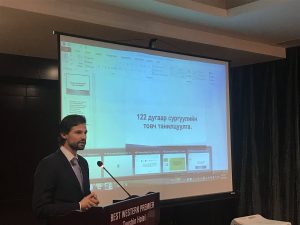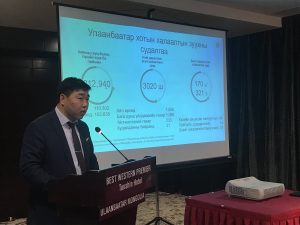
 Ulaanbaatar, 24 October – The GGGI Mongolia team organized a technical meeting today on the Business case of low-carbon small-scale heating solutions for the selected educational facility named 122nd Public School. The business case required consideration of technical, commercial and financial viability. Also, it is integrating perspectives of operations and management and its potential to become part of the national dialogue on alternative heating for buildings in peri-urban areas. During the technical meeting, the project overall objectives, activities, findings and achievements were introduced to the audiences. More than 35 participants, including government bodies from MoE, MET, ERC, representatives from international development cooperation such as KOICA, JICA, UNDP and energy sector experts have gathered to provide their technical recommendations and comments for the project.
Ulaanbaatar, 24 October – The GGGI Mongolia team organized a technical meeting today on the Business case of low-carbon small-scale heating solutions for the selected educational facility named 122nd Public School. The business case required consideration of technical, commercial and financial viability. Also, it is integrating perspectives of operations and management and its potential to become part of the national dialogue on alternative heating for buildings in peri-urban areas. During the technical meeting, the project overall objectives, activities, findings and achievements were introduced to the audiences. More than 35 participants, including government bodies from MoE, MET, ERC, representatives from international development cooperation such as KOICA, JICA, UNDP and energy sector experts have gathered to provide their technical recommendations and comments for the project.
Mrs. Enkhtuya. Yo, senior officer for Energy Strategy, Planning and Implementation Department of MoE, opened the meeting. In her opening speech, she said “GGGI has been successfully contributing in the energy sector development, especially in search for the alternative heat solutions in district areas. The success of the project in finding the best heating solution for off-grid buildings can be adopted for other similar public buildings”.
Romain Brillie, Country Representative, GGGI Mongolia, highlighted “UB city air pollution strongly causes increased number of death of children. In ger district area, there are many off-grid buildings use raw coal for heating, which play huge roles in air pollution the city. Therefore, GGGI decided to cooperate with government stakeholders to find solutions on alternative heating methods for off-grid buildings to reduce the air pollution”
Proposed activities for the Overall Project were to assess and provide evidence based information that there is a strong business case to introduce low carbon heating solutions for buildings in off-grid areas of Mongolia using the example of 122nd public school. Findings of this project are expected to serve as a preparation for the demonstration pilot project and scaling up at national level, if conditions allow. The 122nd school locates in Takhiltiin am, 22nd khoroo of Songinokhairkhan district, Ulaanbaatar. It is newly constructed using the Japan International Cooperation Agency Japanese Grant Aid Project in 2013. Also, the school #122 is one of five public schools that have to operate in three-shifts due to the dense population of its neighborhood. To reduce classroom-load, the UN-PAGE program developed a green building design for its extension building of 640 children in 2017. The extension will be constructed separately from the main building.
Major factors of the project site selection are:
- Off-grid heat sources
- Thermal performance of the building. With a better thermal performance, the building itself can help to promote the green building concept;
- Social inclusiveness and safeguards, e.g number of shifts school operate, direct and indirect project beneficiaries, including pro-poor communities;
- Similarity to other school buildings in the country – size, type of building envelopes; and
- Potential to demonstrate and scale-up the project at a national level;
Background:
In support of the GoM’s immediate agenda to reduce urban air pollution, GHG emissions, particularly consumption of raw coals, and to promote clean energy, GGGI is developing a business case study to identify Low-Carbon Small Scale Heating solutions for off-grid buildings in off-grid areas. GGGI identified low carbon small-scale heating for buildings in peri-urban areas as one of key areas of collaboration with GoM, in consultation with government stakeholders – the Ministry of Environment and Tourism (MET), the Ministry of Energy (MoE), the Ministry of Education, Culture and Science (MECS), the Education Department of Ulaanbaatar /UB/ city (EDUB), and the Energy Regulatory Commission (ERC).